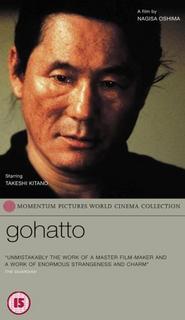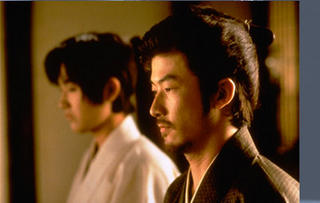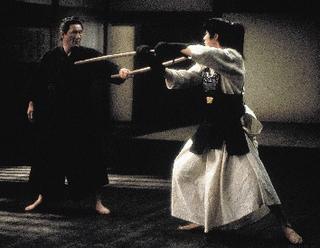Gohatto: where the sword doesn't cut the deepest.
 Gohatto
Gohatto (Takeshi Kitano pictured)
In around 100mins director Nagisa Oshima guides the 1996 "Gohatto" ('taboo', or more literally, 'against the rules') through much more than the Samurai militia movie that cover photo's alude to.
Bringing together, for the first time since 'Merry Cristmas Mr Lawrence', the music and mood setting of Ryuichi Sakamoto with the understated yet on the money (as ever) Takeshi Kitano, Oshima threads together a tale of a garrison of samurai around the time of the decline of shogunate power and an involved murder mystery.
Recruitment brings two new applicants into the garrison. The brash and forthright Tashiro and the beautiful and provocative Kano. As time progresses and the all-male school reacts to the characters brought into the fold, it shows on many levels how repressed love, lust and jealousy can cause ripples that lead to waves through class, honour and even the most the established power structure of the time.

Kano and Tashiro.
What makes this so different from the current crop of sword-and-man themed movies is that this is firmly grounded in very earthly reality. There's not a moment of flying wireplay during the fights, no magic potions are thrown and absolutely no running is done across rooftops. This is fighting with stumbles, trips, brute force sometimes replacing skill and the very human nature of combat, albeit honed.
The same themes are evident in the surprisingly expanded characters - from the new entrants, through to the the highest ranks, nobody is free from the most base of feelings and emotions.
Some scenes are simply breathtaking, especially the entrance by a fully-adorned geisha paid for by Kitano's Captain Hijikata as a method for pouring oil on the troubled waters of the school. Even in scenes like this there is none of the paletted panels of recent epics, reaching for many fewers colours yet painting something more vivid.

Hijikata tests Kano
As a story of death and honour of the period it's very good, but with the many layers of human frailty toning the semi-accepted yet still harshly controlled love of one recruit for another, it lends itself to being quite a unique film.
Anybody out for another "Hero" or "Crouching Tiger..." may be surprised or turned-off by the subject matter, but as a microcosm of man's love for his fellow man, both in honour and lust, this is a restrained gem.
Another Kitano work happily ending up on this Carpathians shelves.
2 Comments:
Wow, what about that news from the Timber Industry eh? Totally wicked and whatnot.
Trouble is, it has erased what I was going to comment... hang on... oh yeah. Gohatto sounds great. I did enjoy Hero and Crouching Tiger, but new and different stuff is always good too.
Wasn't too fond of House of Flying Daggers though. Looked great, fell apart in second half, imo.
Stupidly long timber-related spam removed from above your post, Fence.
Be aware that this is a whole different style film to those you listed - including subject matter some may take offence to.
Me though, I just thought it was a great character study of the period - a little ambiguous in places but overall a good addition to my Kitano collection.....
Post a Comment
<< Home